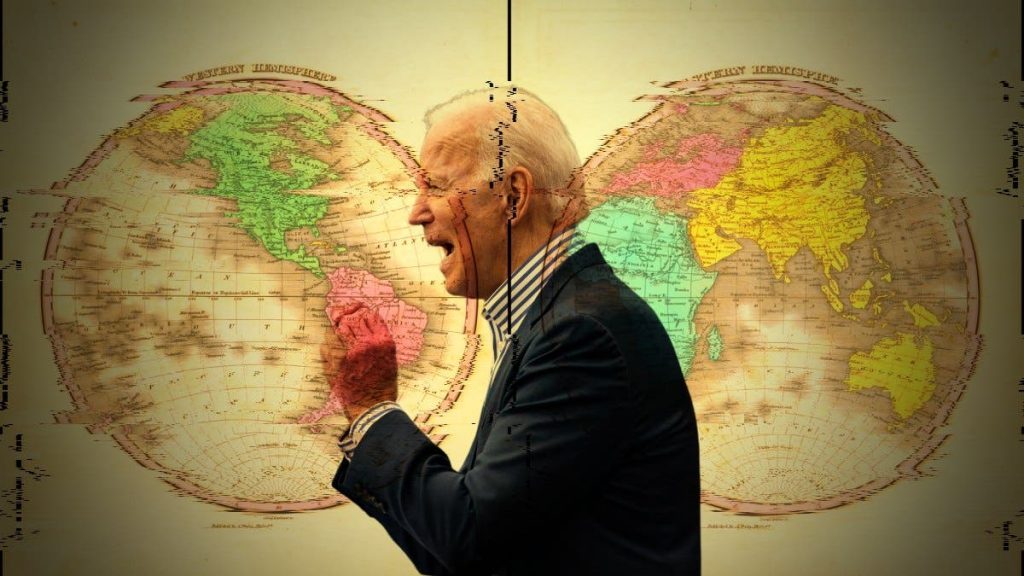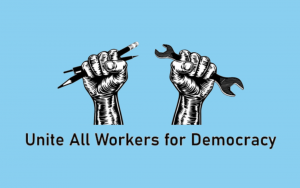On January 6, 2021, the world watched in horror as a far-right mob stormed the U.S. Capitol to stop the certification of election results after the then-sitting president had called on them to do so. A mere two weeks later, Joe Biden was sworn in to the presidential office in a cordoned-off Capitol Hill. In a polarized America, Biden took office with a clear agenda — to restore legitimacy to the institutions of U.S. democracy that lay damaged after four years of Trumpism.
Shortly after taking office, Biden issued the message loud and clear: “America is back,” Biden proclaimed. “America is back. Diplomacy is back at the center of our foreign policy.” This emphatic declaration is notable, especially given the decades-long decline of U.S. hegemony, as the crisis of neoliberalism — which was thrown open in 2008 — deepens. The four years of the Trump administration and its go-it-alone isolationist policy on the world stage had further weakened American leadership globally. As Trump withdrew from global diplomatic institutions, with his “America first” agenda, there was less faith in the United States’ ability to lead effectively. For Biden and the Democratic Party, a central project has been to reestablish the U.S. as a world leader that can lead its allies to address geopolitical crises. Yet, a year later, as Biden’s approval rating continues to fall amid a tanking pandemic response, economic instability, and deepening political polarization at home. As a result, the U.S. is now finding it harder to resolve its foreign policy challenges.
Escalating Confrontation with China
Soon after he took office, Biden sought to return to the path of diplomacy that had marked the decades before Trump’s rule. To hit the ground running, Biden recommitted to global diplomatic institutions. He not only rejoined the World Health Organization, but also rejoined the Paris Agreement, mended relations with his NATO allies after Trump’s confrontational approach, and increased the United States’ engagement within the United Nations. While divided in strategy, however, Biden has pursued the same goal as Trump, which is to confront the growing influence of China. Indeed, this has now been the developing geopolitical confrontation for world capitalism for the last decades.
Not since World War II, when the U.S. wrested the mantle from England, has the question of the global hegemon been posed so acutely. Over the last 20 years, the extraordinary growth of China’s GDP, combined with its growth of manufacturing power, has transformed China into a major player on the geopolitical chessboard. While the brunt of the 2008 financial crisis was borne by the U.S. and Europe, China encountered a huge shock in trade, with exports — a main driver of the Chinese economy — falling by over one-third and tens of millions of workers losing their jobs, especially in production. This, as Esteban Mercatante writes, led the Communist Party bureaucracy to “rebalance” the economy and find new motors to rely more heavily on domestic demand, doing so with huge investments in infrastructure. But, as consumption remains weak, China is forced to expand its markets. This has effectively pushed the Chinese government to develop projects like the new Belt and Road Initiative in an attempt to create an international market for investment and Chinese goods, thus putting China on a collision course with the interests of U.S. capital. The Great Recession brought this conflict out in the open as the U.S. and China began positioning themselves as competitors in the quest for global hegemony. In 2011 the Obama administration announced its “pivot to Asia” and attempted to shore up support for U.S. capital with treaties like the Trans-Pacific Partnership, which were aimed at excluding China and expanding the U.S. influence in Asia. In his first day in office, Trump withdrew from the partnership and, in the years following, launched a trade war with China. But, while China remains the world’s main exporter, and the U.S. the world’s great buyer, the mutual interdependence complicates this conflict, and the two competitors have been unable to “decouple” this relationship.
Amid these challenges to U.S. hegemony, Trump’s ham-fisted “America first” approach further weakened the ability of the U.S. to impose its will. Since taking office, Biden has relied on the old tools of global partnership, leading the rest of the world in creating a diplomatic front against the force it sees as its biggest threat. The Biden administration has made it clear that it considers China its top foreign policy priority. Secretary of State Anthony Blinken said in March 2021 that the administration saw China as “the only country with the economic, diplomatic, military, and technological power to seriously challenge the stable and open international system — all the rules, values, and relationships that make the world work the way we want it to.” While the U.S. does so under the old adage of “bringing democracy to the rest of the world,” much of this geopolitical conflict is driven by the perceived threat to the capitalist world order, atop which the U.S. currently sits.
An important aspect of this continuity is the retrenchment-minded foreign policy that saw American troops pull out of Afghanistan and the so-called end to the war on terror as the U.S. prepares for this new confrontation. To maneuver around larger, tedious, and slower-moving alliances like the 30-country NATO or even the 10-country Association of Asian Nations, the U.S. has also relied heavily on smaller alliances, such as the four-nation Quadrilateral Security Dialogue, or Quad, which includes Australia, India, and Japan, as well as the bloc with Australia and United Kingdom, AUKUS, forging diplomatic defensive agreements and pivoting its military power to confront China. Biden ended the last year with the so-called Summit for Democracy, which was supposedly aimed at fighting authoritarianism and promoting human rights. This was, notably, particularly criticized globally for its invitees, which were essentially all of the United States’ anti-China allies, despite their often atrocious human rights records, and for the hypocrisy of the U.S. leading that charge, particularly when democratic rights are under attack in the country and the institutions of U.S. democracy stood delegitimized. The U.S. also announced a diplomatic boycott of the Winter Olympics in Beijing, which are to be held in February, citing human rights abuses — a move that was followed by Canada, Australia, and the United Kingdom shortly after. This is hypocritical indeed, coming from a country with a police force that murders Black and Brown people with impunity, whose military razes countries to the ground with reckless abandon, and whose government continues to keep families in cages in detention camps on the southern border.
Managing Russia and Iran
But China isn’t the only problem facing U.S. imperialism, especially as the confrontation with Russia escalates, especially in light of the growing confrontation in Ukraine and the influence of NATO. Ukraine has long been an essential component of Russia’s defense strategy, particularly given how close it is to Moscow. While it seems unlikely that Russia wants to annex Ukraine, given the political and economic costs that come with an open war, it does want to guarantee that Ukraine doesn’t join NATO and maintains its neutrality. Over several weeks, Russia has been amassing tens of thousands of soldiers and massive amounts of military equipment on the Russia-Ukraine border as relations between the two countries continue to deteriorate. In light of this provocation, the Biden administration extended its full support to Ukraine. Over the last week, Biden has also thrown his support behind sanctions on Russian leaders, banks, and businesses if Russia escalates hostilities in Ukraine. This comes as several rounds of U.S.-Russia negotiations have stalled.
The Biden administration is also in the midst of renegotiating the Iran nuclear deal, which Trump withdrew from. Passed in 2015, the nuclear deal — known as the Joint Comprehensive Plan of Action (JCPOA) — was signed by Iran with the U.S., China, France, Russia, Germany, and the UK Complaining that the deal was too weak on Iran, the Trump administration withdrew from it and imposed harsh sanctions that deepened the hardship of the Iranian masses. Since then, Iran too has increased its uranium stockpile and pressed on with its nuclear advances. The country also came under a new hardline leadership that is less willing to negotiate than the previous moderate leadership, which was more responsive to the pressures of imperialism. The talks for a new deal have now dragged on for months, as Iran wants the U.S. to lift the sanctions first and allow it access to billions of dollars in frozen funds, while Washington is reluctant to lift sanctions until Iran reverses the advances it has made. Now, as the timeline to restore the deal gets shorter and tensions in negotiations continue to rise, neither side is willing to back down.
Both of these relationships are further haunted by the specter of China. As the confrontation in the east increases, the U.S. faces immense pressure to deescalate the conflict with Russia and Iran. After the Summit for Democracy, Xi Jinping and Vladimir Putin held a virtual meeting in a show of unity. In the negotiations for a new JCPOA, China has also called on the U.S. to remove all sanctions inconsistent with the 2015 agreement. This past week, furthermore, China, Russia, and Iran agreed to hosting joint naval exercises. As nations come into conflict with U.S. interests, China becomes a pole of attraction for new strategic alliances. In the face of this, Washington is openly trying its hardest to curb China’s growing influence, and with that effort comes the need to build better relationships with Russia and Iran.
Threats of Instability at Home Undermine Biden’s Agenda
After the debacle of the Afghanistan exit, there is much pressure on the Biden administration to effectively lead and resolve the primary geopolitical disputes with Russia, China, and Iran in order to maintain credibility, both on Capitol Hill and among its global partners, especially as the three nations broker new economic and geopolitical agreements.
While Biden leads U.S. allies in this global confrontation and tries to restore U.S. legitimacy on the world stage, positing himself as a more competent negotiator than Trump, his degree of success is still an open question as he enters his second term. While he would have liked to say “America is back,” achieving that goal has been made harder, especially in light of the social, political, and economic crisis he faces.
Geopolitical alliances are only one part of the game. As China expands its influence across the world with the Belt and Road Initiative and the “race to the top” intensifies, the U.S. has to expand its own spheres of influence and lead its partners in that project. It is, in fact, this impetus that fueled much of the centerpiece of Biden’s agenda — Build Back Better. During his inauguration, Biden proposed a comprehensive infrastructure plan that would address end-to-end social, economic, and human infrastructure. Although peppered with corporate handouts, this plan included important reforms, including free community college, paid family leave, and more. Tagged at $1.75 billion, the newest version of the bill included billions for developing renewable energy and boosting the competitiveness of existing industries, including steel, cement, and aluminum. The bill was geared not only toward addressing long-overdue social spending that would help stimulate a postpandemic recovery, but also toward strengthening its position in the competition against China. In the summer, Biden also launched the “Build Back Better World” partnership with the rest of the G7 countries for the same ends. With a $40 billion price tag, the initiative was framed to “help meet the tremendous infrastructure needed in low- and middle-income countries,” particularly in Latin America, Caribbean, Africa, and the Indo-Pacific, and it was intended to boost projects in key areas of climate, health security, digital technology, and gender equality. Yet, in essence, the initiative was a mechanism of imperialism to reinforce its own spheres of influence to check China’s growth.
A year into Biden’s term, however, these efforts lay weakened, if not dead. At home, the honeymoon granted to Biden after the events of January 6 was quickly exhausted, with votes in Congress being forced on partisan lines and conservative Democrat Joe Manchin acting as a key swing vote in the Senate. In December, Manchin essentially killed Bill Back Better, saying as much in an interview with Fox News Sunday. While some Democrats still hope to resurrect this bill and bring it to a vote this year, not only will such a bill have to concede far more, but it also still faces a challenge to pass. On the world stage, there is less consensus among the G7 on how strong the pressure on China should be. As Nicolás Daneri reported, Italy — which joined the new Silk Road in 2019 — is willing to be softer on China, especially after it received several shipments of medical aid from Beijing during the pandemic while its Western allies were slow to help.
The power of U.S. imperialism has also diminished even in its so-called backyard: Latin America. Important mass mobilizations have shaken the region in the last few years, particularly against the IMF and the adjustment plans imposed to satisfy debt, most notably in Ecuador in 2019. Particularly in the Southern Cone, the geopolitical alignment seems not to favor the U.S. entirely, especially with the triumph of Gabriel Boric in Chile (a traditional ally of the empire), Alberto Fernández in Argentina, and the open possibility of Brazil’s Lula winning the presidency over Bolsonaro. All this while Biden’s orientation remains as right-wing as Trump’s: supporting Juan Guaidó in Venezuela and promoting an institutional coup, imposing exorbitant debts on Latin American countries, continuing Trump-era immigration policies through a nefarious immigration agreement with Mexico to prevent migration at the southern border coming from Central America, kept children and families in cages, and continued the violent mass deportations of Haitians.
The events of January 6 marked a huge crisis for the U.S. regime, both within and without. Biden took office not in a period of capitalist stability but in the midst of a deep social, economic, and health crisis. Plagued by the inability to pass his agenda, Biden has been unable to herald an era of social stability. The crisis opened by Trumpism continues, and among the great masses, the lack of meaningful solutions fosters a deepening anger at and disillusionment with the Biden administration. As Biden enters his second year, he is in the worst moment since taking office, with some polls giving him a 33 percent approval rating. Without “wins,” he has been forced entirely on the defensive, where he’s been able to do little more than fend off attacks from the Far Right. From voting rights to trans rights, abortion rights and critical race theory, Trumpism, arm in arm with the Republican Party that is desperate to win over its social base, has relied on Biden’s inability to pass his agenda to advance their attacks on democratic rights.
Shortly after the storming of the Capitol, we hypothesized that the tension between the national and international situation would be key in the coming months for U.S. imperialism. Indeed, that continues to be the question of the day. How can the U.S. lead the rest of the world in the fight for “democracy” when it is unable to resolve its domestic conflicts? Biden’s attempt to enlist U.S. allies in the quest to preserve the current world order and restore the country’s geopolitical supremacy faces the constant, looming threat of Trumpism and the delegitimization of the United States’ own institutions. As Biden enters his second year, one thing is clear: the crisis of U.S. hegemony in the world capitalist order can no longer be solved by the old tools of imperialism.
Want to discuss Biden’s first year? Join our online event to discuss these ideas and more on Saturday, January 22, at 3pm.











